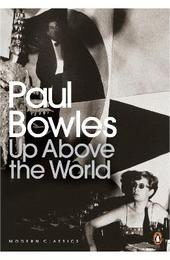
|
Up Above the World
Paperback / softback
Main Details
| Title |
Up Above the World
|
| Authors and Contributors |
By (author) Paul Bowles
|
| Series | Penguin Modern Classics |
|---|
| Physical Properties |
| Format:Paperback / softback | | Pages:240 | | Dimensions(mm): Height 198,Width 129 |
|
| Category/Genre | Modern and contemporary fiction (post c 1945) |
|---|
| ISBN/Barcode |
9780141191386
|
| Classifications | Dewey:813.54 |
|---|
| Audience | |
|---|
| Illustrations |
none
|
|
Publishing Details |
| Publisher |
Penguin Books Ltd
|
| Imprint |
Penguin Classics
|
| Publication Date |
3 December 2009 |
| Publication Country |
United Kingdom
|
Description
A chance encounter while holidaying in Central America leads an American couple, the Slades, to befriend the charming, handsome Grove Soto and his young Cuban mistress. But as the Slades' trip becomes prolonged and they grow increasingly dependent on their new acquaintances, an undercurrent of cruelty begins to disturb the comfort and niceties to which they are accustomed. Up Above the World shows Paul Bowles to be a master of the tension and horror of rising viciousness.
Author Biography
Paul Bowles was born in Jamaica, New York, in 1910. He began composing music and writing stories at a very early age, and at sixteen some of his poetry was published in the French literary magazine transition. At the age of eighteen he began his travels to Europe, North Africa, Mexico and Central America. A student of Aaron Copland, Bowles established his reputation early as a gifted composer. In 1945 he returned to writing short stories and by 1947, when he went to live in Tangier, fiction had become his major focus. He wrote four novels, The Sheltering Sky, Let it Come Down, The Spider's House and Up Above the World; one hundred short stories; a book of poetry; and many travel essays. He lived in Tangier until his death in November 1999. In his obituary The Times described Bowles as 'one of the most unusual, unconventional and gifted men of his time', and the Independent wrote- 'Bowles was a mystic, a man of many abilities . . . he will be seen as a major twentieth-century writer'.
|